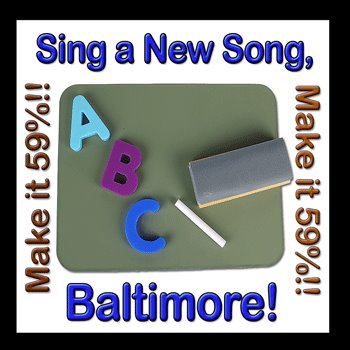These letters are from the current
Baltimore Sun. Read what others are saying about us. Please read, leave comments and if you like, write your own letter of support by writing to:
letters@baltsun.com
Don't wreck school that models successI read with interest and sadness the article about New Song Academy ("Successful school fighting to survive," March 26).
The fairness argument that the Baltimore education establishment throws out is a sure sign that city schools are doomed by uninspired and gutless management worried about parents of poorly educated students complaining about the good education of others.
That kind of reasoning will drag down the entire system to the lowest possible common denominator - and all in the interest of "fairness."
Is it fair that some schools prosper while others do not?
No, but if you don't give succeeding schools a chance to shine, you will not have models to look to in fixing the bottomless money pit of a mess so many city schools are in today.
A calculator could divide the city school budget by the number of students and come up with a "fair" number to spend on each student. But that is not the answer to this problem. And depriving New Song of the chance to continue will not help the many schools that have failed.
Rather than wreck what is good about successful city schools, we should encourage them, learn from them and create more of them.
Tracy Swindell
Baltimore
Connecting the dots to improve schoolsIn Sara Neufeld's penetrating article "Successful school fighting to survive," New Song Academy Principal Susan Tibbels is quoted as saying, "If we won't fund a school like New Song, there's no hope for change in Baltimore City."
In the same article, Ms. Neufeld notes Baltimore schools CEO Bonnie S. Copeland's explanation for withholding additional funding. And that explanation?
If New Song were to receive the funding it needs to retain its high staff level, and with that the means to continue delivering outstanding education, the school system would be obliged to provide every other school the same level of support.
Exactly.
Is it just a coincidence that we read of the conundrum facing Ms. Copeland and New Song within a few weeks of a student strike organized by the Algebra Project demanding that the school system, among other things, address the problem of classrooms having too many students and not enough teachers ("Protesting students say way blocked at school," March 4?
And what are we to make of these events in light of other articles about state government budget surpluses?
Isn't this where some dots ought to be connected?
Dot 1: New Song has succeeded primarily because it has been able to deliver individual attention to its students through a low student-to-teacher ratio.
Dot 2: City schools are a mess largely because funding is not available to hire enough well-qualified teachers.
Dot 3: Investing in our students' education today saves money tomorrow, and better-educated students become graduates prepared to enter the work force and adults capable of being productive members of society.
Dot 4: Visit Baltimore neighborhoods blighted by drug trade, crime, poor housing and few job opportunities, and you can see for yourself the results of inadequate educational investment.
My line of work - bringing art to underserved populations and using art to give voice to those who need it most - brings me in contact with many wonderful organizations and individuals who work tirelessly to right the wrongs staring us in the face.
But witness the situation New Song finds itself in, and we have no choice but to conclude that our work alone is not enough. Government must find the courage to take the lead. And what will it take for that to happen? Ordinary people - each of us - recognizing that it is in our collective best interest to have a well-educated citizenry.
And that should just be a matter of connecting the dots.
Peter Bruun
Brooklandville
The writer is an artist and the director of Art on Purpose.

